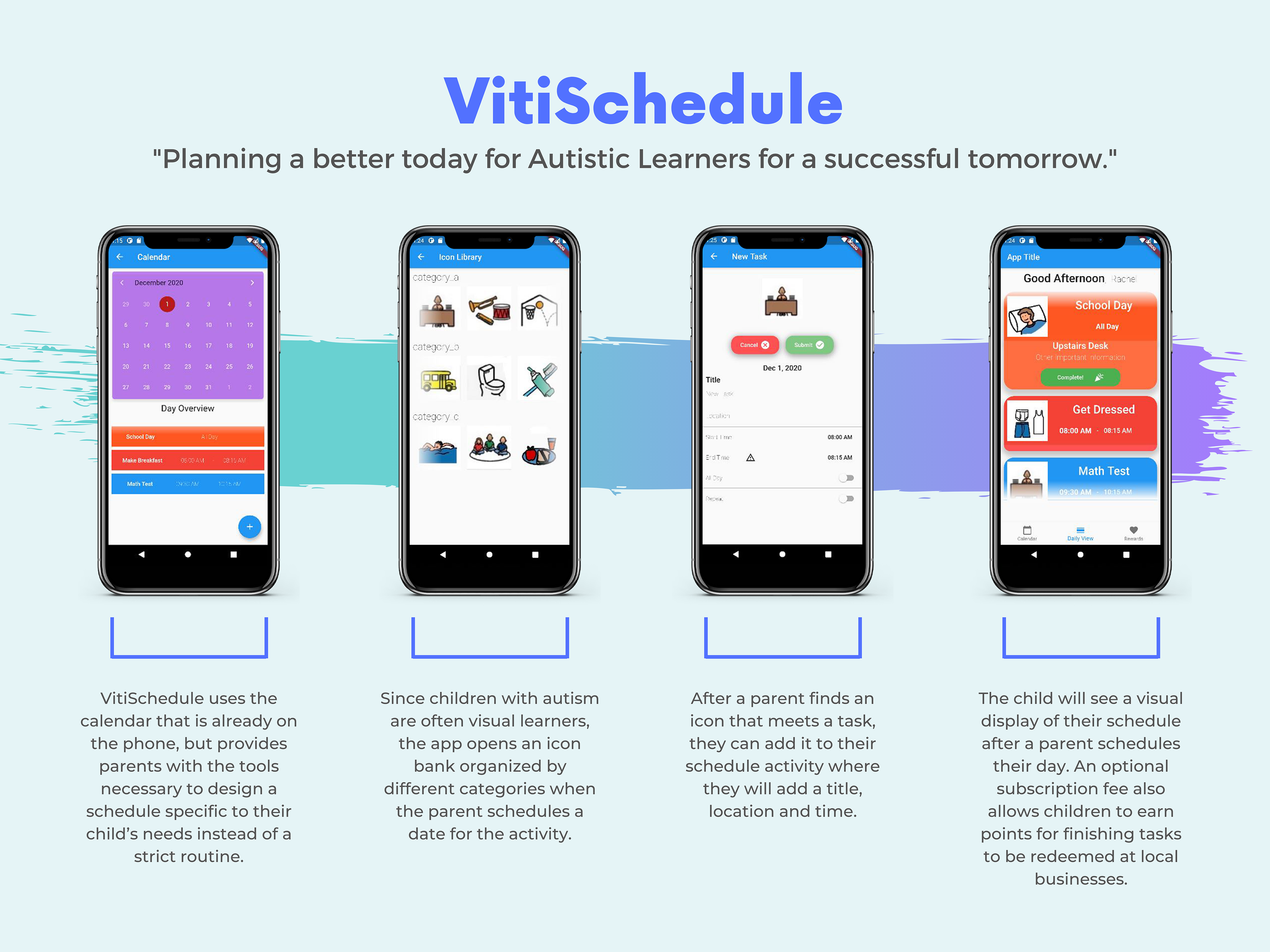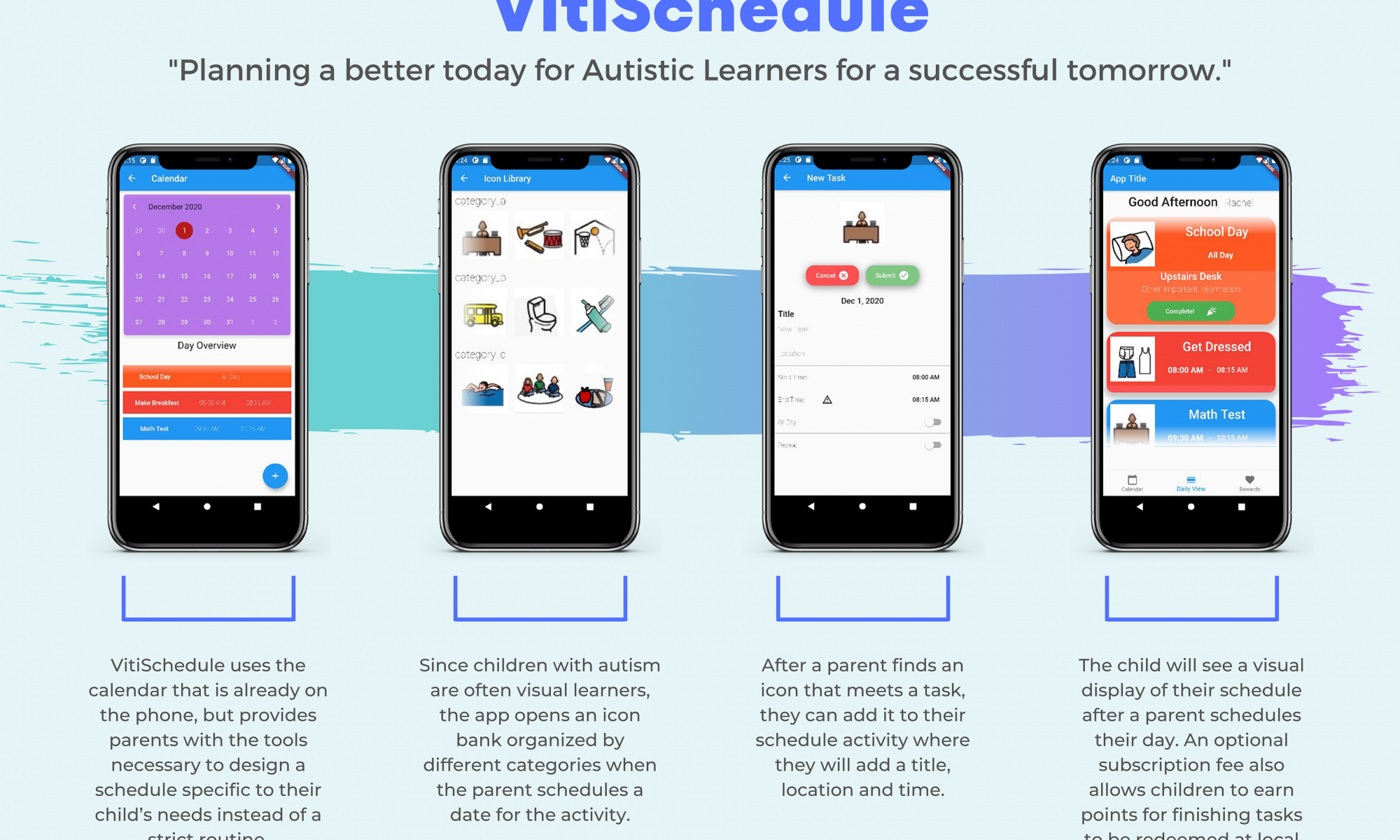
(Maggie Stout/TommieMedia)
VitiSchedule is an app being developed for Apple and Android devices by St. Thomas senior and computer engineering major Rachel Farah to help autistic children during online school. Farah plans to release the app in early 2021.
Farah came up with the idea when COVID-19 hit and she realized, after a conversation with a therapist to autistic children, the struggle these children were having without an educator and a schedule. She created VitiSchedule, which is a mobile app that helps autistic children visualize their daily schedule through the use of icons and the phone’s calendar.
“Online learning completely is like a wall put up against (autistic children) to make learning even harder for them,” Farah said. “A lot of the issues (autistic children) struggle with is something called sensory overload. And that basically means a lack of daily schedule can cause them anxiety and distress.”
In many classrooms, educators use visual calendars to plan out the day for autistic children.
“Children that have autism, they like a schedule and they like things to be predictable,” Behavioral Therapist Melanie Dinca said. “They love the visual calendar to see what the day is like.”
Visual calendars consist of a vertical column that the educator fills with pictures that relate to the activity the child will be doing. This is what VitiSchedule will mimic on a mobile device.
“Why these calendars are so helpful to begin with is because children with autism are typically visual learners,” Farah said. “Having that visual calendar at the front of the classroom, the child can reference it every day. And that’s the same idea with the app.”
VitiSchedule is intended to be used as a way to aid parents during online learning. The app allows parents to click on the day and select icons to give their children of all ages a schedule.
“When you’re working from home, that educator assistance you get in the classroom is completely gone. And then additionally, you have to navigate now rebuilding that structure online,” Farah said. “Online school is working extra against them than the average student.”
Farah says VitiSchedule will make the online school process easier for parents and is a better source than what is on the market currently.
“I wanted to make it accessible for parents, because the tools that are accessible for parents right now, really aren’t that useful,” Farah said. “A lot of them… (are) routine based planning. And basically what routine based planning means is that a parent can plan a morning or night routine for their child, but then that makes the child have to stick to that every single day.”
Farah said routine-based planning works for some younger children, but as they get older and get into more activities, it is harder to keep that same routine. VitiSchedule would make it so parents can make each day specific to their child’s schedule and not force them into a routine.
Another obstacle for autistic children during COVID has been the increase in screen time as up to 90% of people with autism experience some sort of sensory overload according to Spectrum News.
“A lot of screen time for those students isn’t always good. A lot of what pediatricians recommend these students do is take sensory breaks, which is just getting off screens and doing something with your hands or getting outside,” Farah said.
Farah said VitiSchedule will include a feature that alerts children when to take sensory breaks.
Farah plans to charge $1.99 for VitiSchedule and will not include in-app purchases, unlike her competitors.
“It’s not like a get-rich-quick scheme, I just want to get this out there and hopefully help some people,” Farah said. “Life’s difficult enough, there’s no point to add more layers.”
Farah said that despite the app’s skew toward online learning during the pandemic, she believes it will remain relevant past the bulk of COVID-19.
“Even past the pandemic, if that child is going on vacation and they’re in an unfamiliar space, the hope is that it’ll alleviate some of that anxiety by putting structure and having the child know exactly what they’re going to do throughout the day,” Farah said.
VitiSchedule spawned from Farah’s discussion with a therapist who works with autistic children. Farah said the therapist said autistic students were struggling with online learning and needed a way to stay organized, which is when they came up with the idea for a mobile version of the calendar. After that, Farah built the user interface for VitiSchedule and is now developing the app.
Before VitiSchedule, Farah has long been active in social work and education. In the summer of 2019 Farah acted as a mentor for two deaf girls and one hard-of-hearing girl and taught them how to code. She spent the summer teaching them and filmed an episode of the PBS Kids show SciGirls which aired in December 2019. This and St. Thomas’s Playful Learning Lab led her to working more with the Metro Deaf School.
“A lot of my work has been based in education because I personally think that’s the most important thing that we can give to kids no matter what their socioeconomic level is,” Farah said.
Her work in education has impressed people around her, as her friend and St. Thomas senior Mina McMillan voiced.
“Rachel is a very empathetic person,” McMillan said. “It really shows itself in a lot of her work, especially the app that she’s created. That’s directly toward making peoples’ lives easier.”
Farah was raised by a single mother who immigrated to America from Lebanon. This background has led Farah to work more with women in science, technology, engineering and mathematics (STEM). She helped coach an all-female robotics team in St. Paul because of how much her robotics coaches helped her in high school.
“They helped me with the college application process,” Farah said. “That’s what really encouraged me to teach because I saw how much they helped me, and how much they encouraged me that I said, ‘I want to be that for somebody else, too.’”
Farah says her life growing up led her to the point she is at now.
“I don’t think I would have considered making an app for children with autism if I also hadn’t been very, very, very slightly disadvantaged in my life at one point too,” Farah said.
Farah says what keeps her motivated is the hope that something she creates can change someone’s life for the better.
“Rachel just really wants to help people, end of story. She’s incredibly kind and hardworking,” McMillan said.
Scout Mason can be reached at maso7275@stthomas.edu.
Maggie Stout can be reached at stou4257@stthomas.edu.



